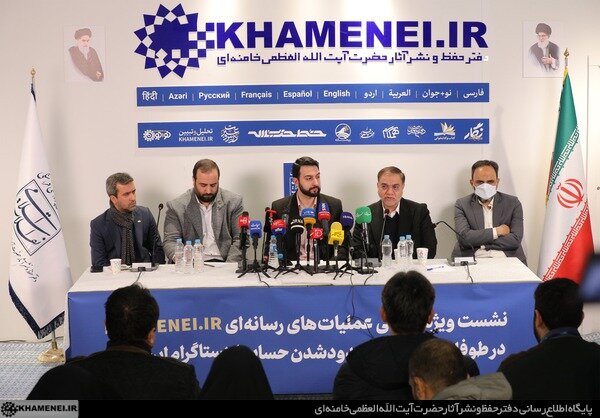White House is principal employer, Meta serves as contractor

TEHRAN — Mohammad Sarfi, the editor-in-chief of the Tehran Times, has weighed in on Meta's decision to block KHAMENEI.IR's media activities, portraying it as a piece in a larger puzzle, noting, "Meta was a contractor for the White House."
A special session was convened to assess KHAMENEI.IR's media activities during the Al-Aqsa Storm, along with the recent blocking of its Instagram account. The meeting took place on Wednesday afternoon, February 21.
The meeting was held at the KHAMENEI.IR pavilion within the 24th Iran Media Exhibition at Tehran’s Imam Khomeini Mosalla.
Present at the gathering were Mehdi Fazaeli, deputy chief of the Office for the Preservation and Publication of Works of the Leader of the Islamic Revolution; Dr. Farshad Mehdipour, Deputy Director of Media Affairs and Advertising Department at the Ministry of Culture and Islamic Guidance; Mohammad Sarfi, editor-in-chief of the Tehran Times newspaper; and Mohammad Lesani, a media expert and researcher.
Mohammad Sarafi delved into the notion of soft power within the framework of U.S. foreign relations theories, emphasizing the enduring influence and ability of non-Western societies to assert themselves amidst the dominance of Western media.
He articulated that in light of this evolving landscape, American theorists are divided into two categories; One faction contends that the potency of these societies lacks authenticity, maintaining Western superiority. Conversely, the other faction advocates for a confrontational stance, advocating for the closure of avenues for engagement with these societies and governments.
Highlighting recent actions by Meta, Sarafi asserted that proponents of the second approach have gained sway over American foreign policy.
He cited an expert affiliated with the FDD Foundation, closely aligned with Zionist circles, who publicly endorsed Meta's actions, even urging Elon Musk to suspend the account of the Leader of the Islamic Revolution on the X platform (formerly Twitter).
Sarafi noted that this American expert characterized Ayatollah Khamenei's narratives as perilous, advocating for their cessation.
Sarafi contextualized the suspension of Ayatollah Khamenei's account within a broader framework, positing Meta as merely a contractor executing directives from the White House.
He stressed that any serious push for demanding accountability regarding account suspension should be directed at the American government, rather than Meta, which is ostensibly a private entity executing user bans.
In early February, Meta stirred controversy by abruptly removing Instagram and Facebook accounts belonging to Ayatollah Khamenei who had a substantial following of 5.1 million users. The decision, made without prior notice, underscored the company's pro-Israeli stance.
In 2023, the Instagram account KHAMENEI.IR ranked among the top 10 accounts of world leaders.
Remarkably, posts on the Farsi-language account garnered over one hundred million views in the past three months. This account, active for twelve years, boasts a staggering nine thousand posts that received eighteen million comments.
Formerly known as Facebook, Meta now owns a quartet of platforms: Instagram, WhatsApp, Facebook, and Facebook Messenger. Headquartered in Menlo Park, California, Meta provided a scant explanation for its actions, citing violations of its Dangerous Organizations and Individuals policy as justification for the account removals.
This move coincided with Ayatollah Khamenei's support for oppressed Palestinians and condemnation of the genocidal war in the Gaza Strip, a stance he has steadfastly maintained since October 7. Meta's actions raise fundamental questions about the role of social media platforms in regulating political discourse and the expression of support for contentious causes.
The incident highlighted the delicate balance between freedom of speech and the enforcement of platform policies, particularly concerning influential figures like Ayatollah Khamenei. While Meta's subsidiary platforms profess to foster an environment of free expression and diversity of opinion, their practices often align closely with U.S. laws and policies, potentially stifling dissenting voices that challenge mainstream narratives.
The removal of Ayatollah Khamenei's accounts signaled two significant realities. Firstly, it cast doubt on Western claims of upholding freedom of expression, revealing a willingness to silence expressive and influential voices without hesitation.
Secondly, it exposed a broader pattern of support for the Israeli regime, which has faced widespread condemnation for its violent actions against Palestinians.
Meta's actions are just one facet of a larger trend of political and media support for Israel, highlighting the West's willingness to sacrifice principles for geopolitical alliances.
Culled from Tehran Times

